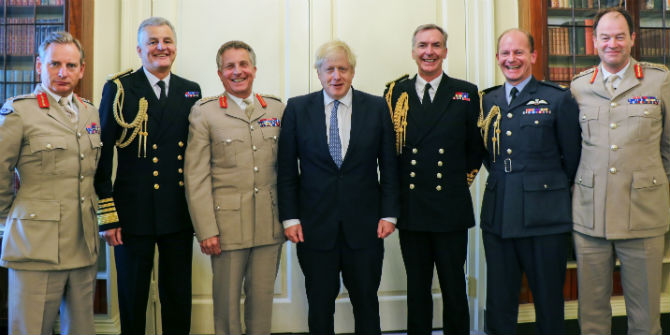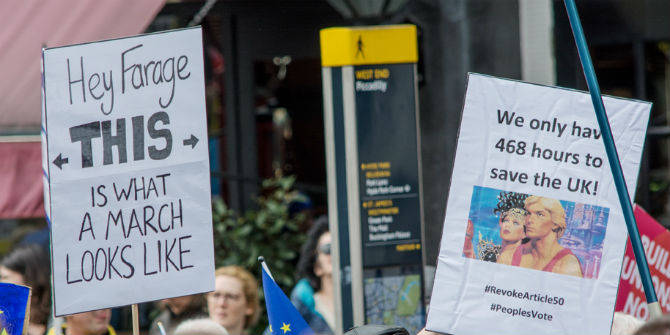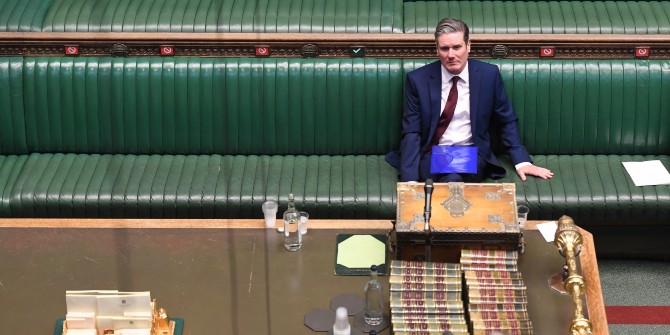 In the 1970s, Lord Hailsham warned that Britain was in danger of sinking into an ‘elective dictatorship’ because of the vulnerability of its constitutional arrangements. Julian Petley (Brunel University London) says his warning, which was aimed at the left, is more relevant than ever as Boris Johnson’s government tries to impose its will on Parliament.
In the 1970s, Lord Hailsham warned that Britain was in danger of sinking into an ‘elective dictatorship’ because of the vulnerability of its constitutional arrangements. Julian Petley (Brunel University London) says his warning, which was aimed at the left, is more relevant than ever as Boris Johnson’s government tries to impose its will on Parliament.
Not only did Boris Johnson attempt (albeit unsuccessfully, thanks to the Supreme Court) to prorogue Parliament, and not only did he threaten to ignore the result of any no confidence vote, but Michael Gove has stated that the government would ‘wait and see’ what legislation aimed at preventing a no-deal Brexit was put forward by MPs before deciding whether to abide by it. That legislation, which requires Johnson to ask the EU for an extension to the Brexit date of 31 October unless he has struck a mutually acceptable deal with them by 19 October, has now successfully passed through both Houses, although not before Johnson threatened to pack the Lords with hundreds of Brexit-supporting peers.

The Prime Minister has said that he would rather ‘be dead in a ditch’ than ask for such a delay, telling the Telegraph that the new law obliges him only ‘in theory’ to do so, and has written to Tory members informing them that Parliament ‘just passed a law that would force me to beg Brussels for an extension to the Brexit deadline. This is something I will never do’. Meanwhile the foreign secretary, Dominic Raab, has stated that the government would ‘look very carefully’ at its ‘interpretation’ of the legislation, and that ‘we will also – because this is such a bad piece of legislation – want to test to the limit what it actually lawfully requires’.
Similarly, after the Supreme Court judgement was announced, a No 10 source accused the Court of making ‘a serious mistake in extending its reach to these political matters’ and Jacob Rees-Mogg reportedly told colleagues on a cabinet conference call that the supreme court judgment was a ‘constitutional coup’.
Johnson’s tactics have been widely condemned as anti-democratic, although it is entirely unsurprising – if predictable – that he has received vociferous support from the relentlessly populist Tory press.
‘Tacit understandings’
These authoritarian ploys have been attributed as much to Dominic Cummings as to Johnson himself, with the senior adviser described as ‘poisoning politics’, a ‘career psychopath’, an ‘unelected, foul-mouthed oaf’ and a ‘political anarchist’ (and that’s just by Tories). However, what these manoeuvres actually reveal is the fragility of this country’s constitutional arrangements – although these have now been both clarified and strengthened by the Supreme Court. Nonetheless we are witnessing just how easily these arrangements can be manipulated and exploited by the ruthless and unscrupulous: those not signed up to what Peter Hennessy refers to as the ‘good chap theory of government’. Given that Johnson’s stratagems threaten to involve the monarch directly in the political process, it’s important to stress that the ‘reserve powers’ of the Crown are still active when it comes to calling elections and appointing Prime Ministers, even though no dissolution request from a PM has been refused by a monarch since before the Great Reform Act of 1832. But as Hennessy points out in his book The Hidden Wiring, all party leaders who have sought power since the second world war have accepted the vitality of those powers and, privately, that they must conduct themselves within the ‘tacit understandings’ – to use Sidney Low’s phrase – that accompany them, by not placing the monarch in a position where he or she would become embarrassed or, worse, politicised.
‘The elective dictatorship’
Hennessy’s remarks about ‘good chaps’ recall the point made by the former Lord Chancellor, Lord Hailsham, in October 1976 in his BBC Richard Dimbleby Lecture, The Elective Dictatorship, namely that the only limitations on the sovereignty of Parliament are
‘political and moral. They are found in the consciences of members, in the necessity for periodical elections, and in the so-called checks and balances inherent in the composition, structure and practice of Parliament itself’.
This is a good moment to re-examine what Hailsham meant by the elective dictatorship, and to see whether it offers any useful pointers in today’s fraught circumstances. At a time when the powers of Parliament are under severe threat from government, it might not seem an opportune moment to recall Hailsham’s lecture, but the crucial point to bear in mind is that his phrase refers to the fact that Parliament’s legislative programme is determined by the government, whose bills virtually always pass in the Commons thanks to the majoritarian, first-past-the-post electoral system and the imposition by the whips of party discipline on the governing party’s majority. Thus there is a strong tendency towards executive dominance, and this is compounded by the constitutional inability of the Lords ultimately to block government initiatives.
The government machine
Once, Hailsham argued, such a situation may have been ‘thought tolerable in practice’. But, in his view, various factors had in recent years combined to make the Commons itself a threat to liberty rather than a stout defender of it. The reasons for this lay not only in the decline of the power of the Lords, but also the growth of the power of the executive in the Commons. As Hailsham put it:
Until recently, the powers of government within Parliament were largely controlled either by the opposition or by its own backbenchers. It is now largely in the hands of the government machine, so that the government controls Parliament and not Parliament the government. Until recently, debate and argument dominated the parliamentary scene. Now it is the whips and the party caucus.
Furthermore, the Commons are no longer really ‘masters in their own house’:
Not so long ago, influence was fairly evenly balanced between government and opposition, and between frontbenches and backbenches. Today, the centre of gravity has moved decisively towards the government side of the House, and on that side to, to the members of the government itself. The opposition is gradually being reduced to impotence, and the government majority, where power resides, is itself becoming a tool in the hands of the cabinet … The sovereignty of Parliament has increasingly become, in practice, the sovereignty of the Commons, and the sovereignty of the Commons has increasingly become the sovereignty of the government, which, in addition to its influence in Parliament, controls the party whips, the party machine, and the civil service.
Since Hailsham wrote these words, this state of affairs has only become more embedded: prime ministers have acted in an increasingly presidential style; there has been a proliferation of ‘spads’ (special advisers, described in the code governing their behaviour as ‘an additional resource for the minister providing assistance from a standpoint that is more politically committed and politically aware than would be available to a minister from the permanent civil service’); and ministers and prime ministers have made use of the royal prerogative, which enables them to, among other things, deploy the armed forces and make and unmake international treaties. As these may be exercised without parliamentary approval or scrutiny, they are best described as ministerial executive powers.
Talismanic significance
Hailsham also criticised what he calls the ‘doctrine of the mandate’:
While before the election the manifesto is written rather in the style of an advertisement for patent medicine, after the election it is treated as a pronouncement from Sinai… The measures proposed in the manifesto often include the impossible, the irrelevant and the inappropriate. But it is here that the doctrine of the mandate takes over. However small the majority, however ill-advised the promises, however controversial the programme, the party activists, flushed with victory, insistently demand the redemption of all the pledges in the shortest possible time, and they are vociferously egged on by the various pressure groups whose collective support has been won by the making of the pledges.
But this doesn’t occur only in the case of manifestos created whilst in opposition – witness the all-too-predictable consequences of the Tories’ 2015 manifesto promising an EU referendum, and their 2017 manifesto stating that ‘we continue to believe that no deal is better than a bad deal for the UK’, a line that has taken on talismanic significance for Brexiters.
‘Ideological bigotry’
Somewhat counterintuitively, Hailsham’s target was not governments with large majorities, but those with slim ones which, because of the nature of the parliamentary system, were nonetheless able to pass a large number of their bills. In Hailsham’s view, the fact that a government did not enjoy wide support in the country, as measured by general election results, made such actions democratically illegitimate. It must be stressed that he gave his lecture during a period of Labour administrations. The Harold Wilson government elected in March 1974 was a minority one, and that elected in the following October had a majority of only three. Wilson was replaced by James Callaghan in March 1976, and within a year his government had lost its majority through by-election defeats. The Lib-Lab pact was signed in March 1977 and remained in force for sixteen months, with the government also managing to stay in power thanks to unofficial deals with the Ulster Unionist Party and Scottish National Party.
Hailsham was concerned about the ‘elective dictatorship’s’ capacity for ‘giving control to relatively small minorities, and its dependence upon the enthusiasm of political caucuses and other outside bodies and pressure groups whose zeal, ideological bigotry and desire for irreversible change all too often outrun their discretion’. He doesn’t explicitly point the finger at the Left in this respect, but in The Dilemma of Democracy (1978) it’s pretty clear who he has in his sights:
‘The electorate is itself markedly moderate in its views. But where the caucus is infiltrated, a few extremists have it in their power to deny them the right to vote for a moderate candidate’.
At the time (and indeed for long after) ‘extremist’ was a barely coded synonym for ‘left-wing’ and ‘moderate’ for anyone to the right of such a position. He also complains that ‘some of the safe seats in the Labour-held cities in England hold about 20,000 voters. Some of the Conservative or marginal seats on the periphery represent 100,000 or more’ and that ‘twice, at least in my Parliamentary career, I have had personally to complain about direct gerrymandering by Labour home secretaries’.
Remarkably, the present government’s insistence on governing by executive fiat ignores the fact that, if such a course of action was allowed to pass unchallenged, it would put precisely the same powers in the hands of a Labour government – including one headed by Jeremy Corbyn.
The wrecking ball
Hailsham’s remedies include a bill of rights as part of a written constitution, ‘one which limits the powers of Parliament and provides a means of enforcing these limitations both by political and legal means’. However, he doesn’t mention the European Convention on Human Rights, to which Britain acceded in 1951. Whether a bill of rights would be able effectively to loosen the grip of the ‘elective dictatorship’ would all depend on what is in it. Dominic Raab outlined plans for a bill of rights in his 2009 jeremiad The Assault on Liberty, and these formed the basis for the Tories’ proposals for changing Britain’s human rights laws.
Hailsham concluded that the constitution he envisaged could not be created ‘so long as we are content to muddle along in the good old British way’. In the interim we have seen the European Communities Act 1972, a degree of devolution, the Human Rights Act 1998 and limited reform of the Lords, but still no written constitution. And now we see, in the starkest possible terms, the consequences of ‘muddling along’ without one, as Adam Wagner has pointed out. Could Hailsham ever have imagined that the threat of the wrecking ball would come not from left-wing ‘extremists’, but from ideologues and zealots on his own side?
This post represents the views of the author and not those of the Brexit blog, nor LSE.
Julian Petley is an Honorary Professor in Social and Political Sciences at Brunel University London.






